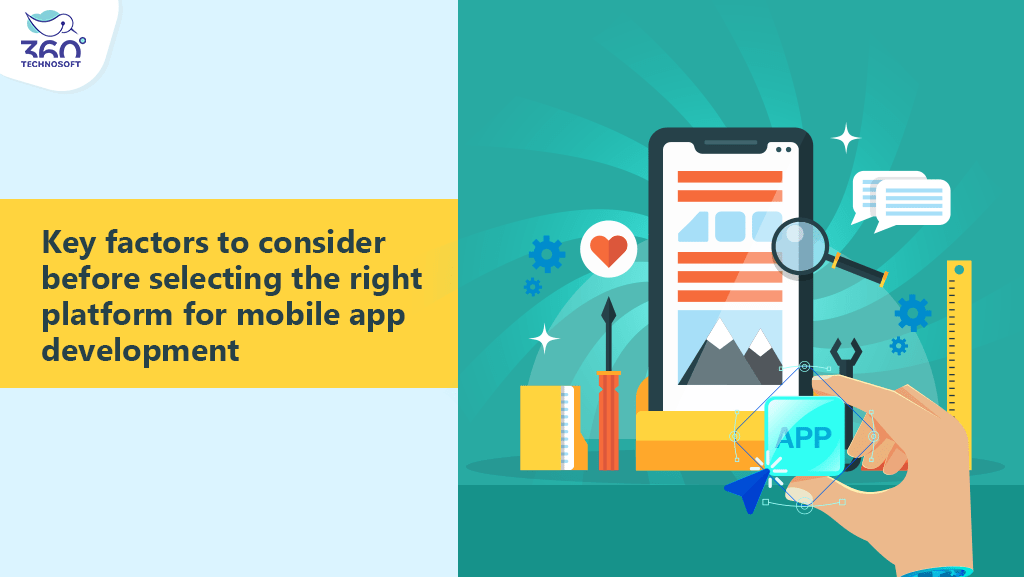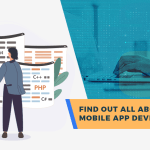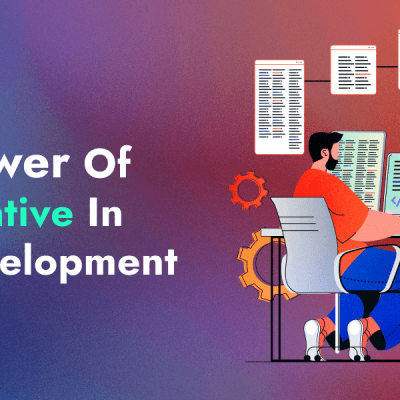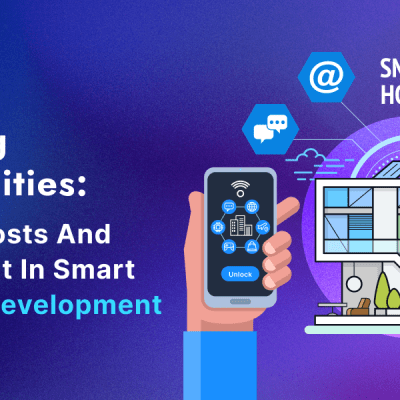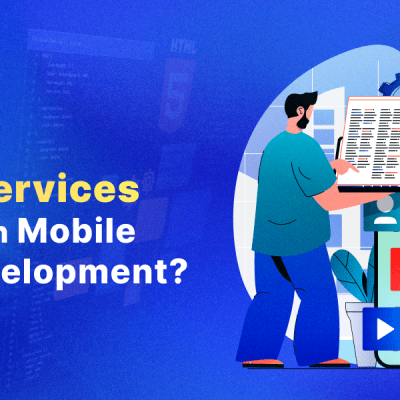Selecting a mobile app development platform is a crucial part of the entire app development process. However, one can certainly bring clarity on this matter upon addressing basic things. For example, the first thing one needs to ensure is whether he/she needs a native or something cross-platform.
Not just about quality, a mobile application development platform is important from a business perspective as well. In fact, it is important from a strategy development perspective also. The selection of the right platform brings clarity about the kind of tool one needs for successfully developing a mobile application.
While deciding about the platform, one needs to first have clarity about the pros and disadvantages of each. Also, the market of a mobile app is indeed witnessing massive competition. Hence, finding the best mobile app platform is certainly challenging. It can be confusing sometimes for the business groups to take the right decision. To make things simpler on this matter, below are some of the key points one may take into account.
Know about the target audience and their location
When it comes to developing apps, the first thing that comes to mind is the best mobile app developers. However, it is crucial to think of the target audience first prior to that, regarding the platform. There are many advantages to it. First of all, it brings clarity about preparing a comprehensive customer profile. Moreover, the developers get clarity about the kind of devices that the potential customers use.
The next thing to emphasize is geographical constraints. Primarily, platforms differ significantly from one geographical location to the other. For example, if the target audience is from Europe, android is indeed a better option. Similarly, iPhone is a better platform if the target audience is from the US. One may take the market research reports into account as well for greater clarity.
The kind of features targeted user base loves and is ready to pay for
The secret behind most of the mobile application development services is that they understand the end-users well. Specifically, they understand the way the target user uses devices and applications. Most importantly, they understand the expectations they have in mind.
It means understanding the expectation of the user is as important as enhancing the user interface. For example, iOS users are always hopeful about something innovative. Similarly, android users are optimistic about upscale aspects. Irrespective of the platform, user interface, and design is something that matters for all.
One can make things look simpler upon understanding what the user will be happy to pay. For example, iOS users are always happy to pay for creative features. On the other hand, android users are happy to pay for something that is more user-friendly.
Things to ensure from the developer’s perspective
Intuitiveness is one characteristic that every user loves. Hence, one must enquire about the platform that can make things more intuitive for the app. same is the case about user-friendly characteristics as well. A platform must support the way a developer wants to make the app look user-friendly.
Also, the developers need to ensure whether they can work in concurrence with the development cycle. At the same time, checking the functionality of the tool on a certain platform is also important. This is crucial to have an evaluation of the overall product. Alongside, one must also review all the associating tools. One must take a decision only after having clarity on these aspects.
Considering different dimensions of app development cost
App development cost is something that highly matters while selecting the platform. However, there are many factors one needs to consider. First of all, one needs to consider the cost of infrastructure. Next, one needs to consider the cost of licensing the tools for development. Apart from this, one needs to consider the costs of the development cycle and the cost of deployment as well.
There is another dimension of cloud base services one needs to consider as well. However, one needs to consider this only if the client is a business group. One can make things cost-effective upon considering the extent of workload the client wants. Accordingly, one may add selective features to make it more budget-friendly.
While developing, it is important to go ahead with the upfront expenses. In short, it is important to consider the expense of ownership as well. It is thus important to keep the enduring expenses upfront in the mind of the developer.
Most people don’t understand, but those services are costing nominal in the short while cost higher in long term. Sometimes, it might not be a couple perfectly with other available systems. Also, it may not deal with functionality essential for businesses. Those looking to lower budgets may consider open source tools. However, one needs to consider integration costs and support costs as well.
Apart from these, there are some additional expenses one must consider. For example, one needs to consider the cost of buying a developer account. It is the account that one needs for submitting an application. Anyway, the cost of opening an account for Apple costs a hundred dollars. Additionally, there remains $299 for Enterprise programs. Coming to Google Play, i.e. for android, it costs an extra $25 for its service.
Costs of hybrid apps
Those looking for additional cross-platform app development need to have other considerations. Specifically, they have to pay both for releasing their product or application. It’s a misconception among many that an application that does well with numerous platforms is cost-effective. However, this approach may not be right on all occasions. Yes, one won’t feel it is an ideal option to pay different developers.
Obviously, paying one developer seems a smarter idea. But, on a practical note, it is not as simple as it seems. Primarily, such misconceptions appear as people have vague clarity of hybrid applications. Moreover, this is a web page that is customized for using different devices. And, these remain in a native device. This enables them to have access to certain native specs.
One needs to notice here is that it doesn’t access all features. Specifically, things may not work in the case of complex functionalities. On the other hand, with such tricky functionalities, people want more. For example, one may consider the processing of images as one such feature. Similarly, live streaming of videos can be another fine example as well.
There are many instances where hybrid apps have failed with such features. Well, this doesn’t mean that one should discard the idea of a hybrid app altogether. Rather, it is wise to have clarity about areas where this works, and where it doesn’t. In short, one can understand that cross-platform applications are cost-effective but deliver lesser outcomes.
Important considerations regarding lifecycle management
A mobile app development project is not necessarily about coding. There are many other aspects that these companies consider. For example, it involves testing, deployment, hosting, and analysis as well. In fact, all these aspects one needs to consider until the app is there in the market.
Apart from these, developers also need to pay special emphasis on data. Moreover, they need to think of data storage and regarding their security. Also, one needs to consider how one can integrate it along with other devices.
An app is certainly not meant for only one kind of device. It means the developer needs to consider all platforms. Additionally, there are different mechanisms of delivery one must consider. In accordance, the strategy must enhance every device that they want to support. ‘
It is important to consider whether it will be native app development or an outsourced one. Most importantly, there should be clarity on whether the apps can function alongside. Specifically, there needs to be clear whether it can work all through the life of the application. Quite similar is also the case when a business employs native tools in combination with outer services.
Similar strategies work even when the developers opt for wholesome service. It is primarily based on the cloud. In general, the developers come up with significant tools for addressing every single issue. Overall, the developers need to consider all aspects related to the service. Developers need to figure out specifically the essential services.
Moreover, they must ensure the service is actually deliverable. Most importantly, it is crucial to ensure that the tool can integrate in a seamless fashion. It must integrate well along with additional systems. Overall, it should provide a significant foundation for scaling up.
Important security factors to consider
Primarily, an app development platform for mobile must make things smooth for administrators to employ native security controls. In this context, the iOS platform is highly popular for keeping the explicit data of users safe. Along with regular measures, there should also be features of fingerprint scanning. Basically, it must get as tough as possible for safety access.
From a safety perspective, the cloud is indeed a great aspect one must consider. Primarily, cloud data storage turns things absolutely tough from a hacking perspective. Similarly, customization is also one aspect one must consider from a safety perspective. Android is indeed a preferable option in this regard. It lets users customize the security of the phone the way they wish for.
Apart from these, government norm is also a key factor one must consider. It matters irrespective of the development tool one makes use of. Primarily, this matters the most for those who use cloud services. It is essential to comply with government norms for using cloud services, in concern with the data. Developers must ensure that the service should make things simpler for cross-platform development. Here security must not be a constraint.
The ease at which a platform can meet with additional tools and services along its lifecycle
This is an important factor to consider for android and iOS app development companies. Integration is crucial for one to consider all through a mobile app’s lifecycle. Hence, the tool must facilitate smooth integration with other systems. Moreover, it must let the developers develop apps with essential integration.
Additionally, the tools for development must also let them develop apps. It should meet well with the already available back-end system. The tools must also manage by the couple along with other crucial systems. It must ensure a consistent delivery model.
The level and kind of skill essential for it
It is certainly true that things have gone easy about platform selection by finding the best app development software. Still, there are certain aspects where manual coding is quite essential. In fact, no matter if the mobile application development company opts for nominal-code strategies, still, there are certain aspects one must write manually.
In the case of cross-platforms, it depends extremely upon HTML. It also depends upon JavaScript. C# is also felt essential on most occasions. Comparatively, these are preferable over Java. Hence, one must enquire well about the ability of the development team. One must confirm that the skill level meets well with the specific language of the given platform.
On some occasions, businesses remain in a fuss to release the application. Here, the developers must opt for services providing sample codes. The good news is that one can avail templates as well. In fact, there are service providers offering customizable segments as well. These things certainly make the process simpler. Most importantly, it turns things more efficient and flawless, at the same time, quick delivery.
Also Read: A Complete Guide to API Development: Process, Tools and All You Need To Know
Consider both advantages as well as disadvantages
It is important to understand both aspects. Irrespective of the kind of app one develops, it has to come with its own pros, as well as cons. In general, the built-in applications are way more superior. Basically, these are efficient from a UI and performance perspective. However, it is also true that these are much expensive in nature. These take a much longer period for development as well. Specifically, it takes higher time for those going to develop for numerous platforms.
When it comes to deployment, web apps indeed are much efficient. These are quite simpler in nature as well for development and deployment. In the case of hybrid applications, these stay on a little lesser side. In short, there are numerous aspects one must consider prior to finalizing the tools for the development process.
Must consider the moderation aspects
Selection of platform is crucial from a moderation perspective. For example, moderation is more challenging when it comes to iOS. In fact, rejection is quite sure in case the application doesn’t meet with norms of Apple regarding the application characteristic.
In short, one needs to remain aware of the norms really well. It may not be possible always to go through every bit of rules. On such occasions, the best recommendation will be to go through the guidelines of the App Store. One can easily find these norms through the official site of Apple. Most importantly, one should not consider anything other than official sites. In most cases, these unofficial sites are misleading. Generally, Apple takes a period of 10 days to decide about acceptance. Now, those who can’t afford this much of time obviously has to look for other option.
Otherwise, one may enquire about the circumstances leading to the rejection of applications of other users. Moreover, one needs to ensure that the app doesn’t collapse. Similarly, it must not possess any iAd banners as well.
For greater clarity, one needs to understand the reviewing process of the platforms well. To be specific about iOS, it is quite strict about reviewing process. However, the case is certainly not the same for Google Play. In fact, Google Play is known for its feeble system of moderation.
Similar is the case about piracy applications as well. Those developing for android should go through the rules of the respective platform. However, due to the simplistic moderation number of piracy apps over it is more in comparison. Hence, one needs to be a bit careful about this matter.
In fact, it enables users to download the specific .apk file, irrespective of the app. obviously, one can install the same over the devices. Noteworthy here is that the same one can never expect with Apple.
There are factors like availability, as well as a performance one needs to consider. Apart from this, scalability is a key factor to consider. They must understand the modes of executing upgrades. At the same time, understanding the modes of handling maintenance is equally crucial as well.
Many companies prefer going to external services. However, randomly opting for services can be repenting. Hence, they must possess clarity regarding agreements at the very level of services. They must possess clarity about the ability of vendors to deliver things. After all, there remains very little in a developer’s hand to handle moving ahead of fundamental customization.
Ultimately, those who want to emphasize uniqueness should go for Apple Store. But, it is important to maintain the quality of the best class before that. Similarly, those who are not emphasizing much about uniqueness can go for Play Store. Also, those in a hurry can find Play Store a better option.
Requisite Features
In most cases, people think that they are very sure of requisite features. However, this is not the case often. Primarily, people go for or lock the features that sound well. But, one needs to ensure that the specific feature doesn’t disrupt the user-experience characteristic in any fashion. At the same time, how well the specific feature will do is also an important consideration.
In this context, different platforms provide different advantages. For example, for those prioritizing developing custom apps along with a homely look, iOS certainly is the best pick. If the feel of the application is what matters, then android is more suitable. Anyway, one must understand that native apps often do well. These are the best picks from usability perspectives. Moreover, it helps in maintaining overall experience good.
However, in modern times people want their application to do well across platforms. On such occasions, opting for a cross-platform mode of project development is critical. But, here too, there are certain aspects one must keep in mind. For example, certain specs function well in built-in platforms. And, others are doing well for cross-platform options.
All in all, one must select the platform upon considering all the above points.
The level of support one needs as per the user base, and the level of reach one aims
It is good to have clarity about the level of reach one aims of. For example, an android is a good option in this context for expanding reach. Noteworthy here is that the devices are complying with android cross 160 elements. Interestingly, android aims at growing this figure even more. However, things are different in the case of Apple. Specifically, the iOS 9 complies well with fifteen types of devices.
However, there are different versions in it, ranging from iPads to iPhones. This is why Apple is as tough as a platform. After all, preparing an application for every type of device is not an easy option. Quite similar is the case with the Windows platform as well. Specifically, Windows 8.1 version at present does well over a hundred devices.
In comparison, Blackberry is quite simplistic in nature. It supports just ten numbers of devices. However, very fewer people would take interest to know that the app is on Blackberry. In fact, Windows 8.1 is also not a prominent name in this context. The problem with these platforms is not about their adaptation.
Rather, these are not up-to-the-mark in terms of application support. Who doesn’t know about WhatsApp? It’s quite synonymous with messaging at present. However, both Windows and Blackberry users don’t get it. The reason is that WhatsApp doesn’t support these. It means going with a hybrid app; one needs to consider all these, no matter what they support.
Conclusion
So, one can take the above points to make a better decision on an application platform selection. Apart from this, there is a brand loyalty factor that one also needs to consider. For example, Apple users are quite loyal to the services of the company. They expect the ultimate usability.
Comparatively, users of Android emphasize more on the cost-effectiveness of the app. In short, there is no strict rule about which platform is good or bad. It all depends upon the kind of app one develops or the target user base. One can certainly find the best option by considering all these points.
